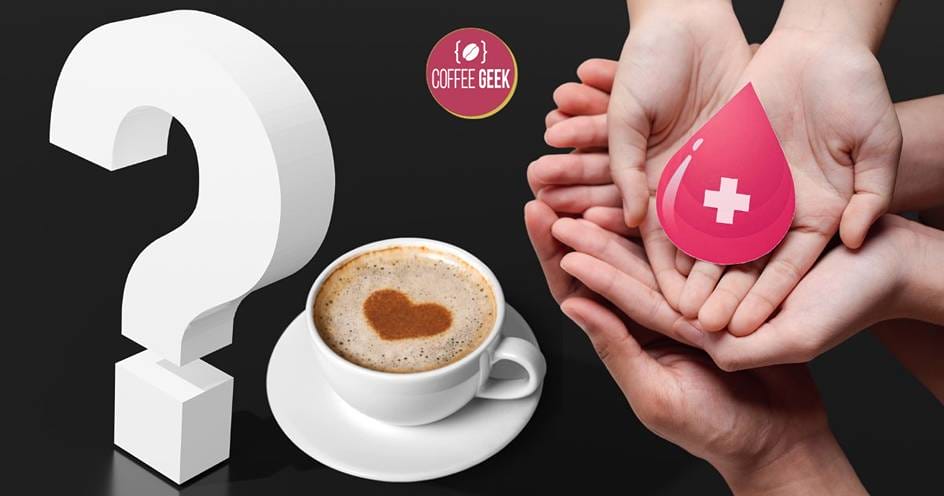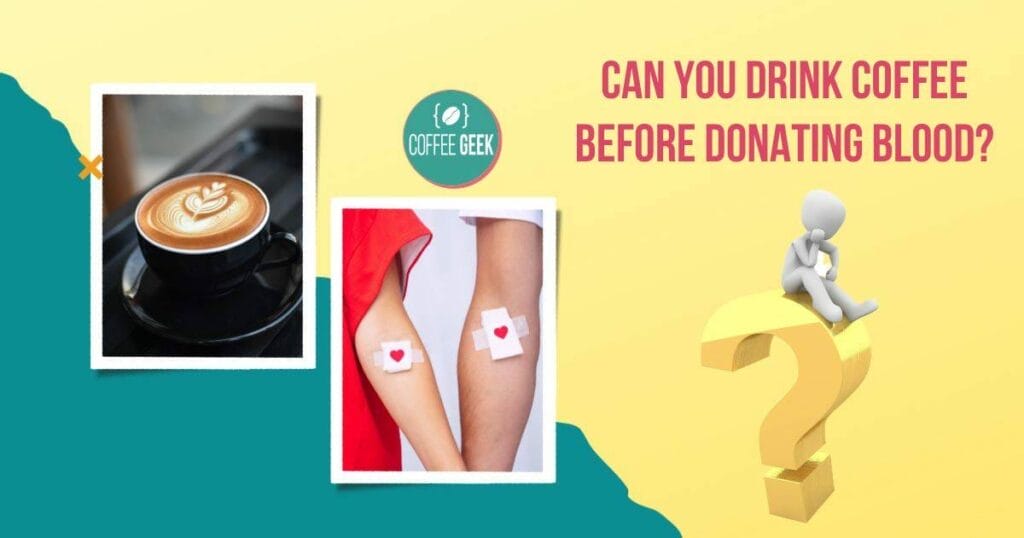Welcome to this comprehensive examination of a frequently asked question regarding blood donation. Have you ever wondered if you could drink coffee before donating blood?
As any seasoned donor knows, blood donation requires adherence to several guidelines before, during, and after the donation process.
The Impact of Coffee on the Body
You might think of coffee as just a reviving drink, but coffee remarkably impacts your body, especially your blood system.
Mostly, having a good understanding of how coffee affects your body and blood could shed light on whether you should take coffee before donating blood. Can you drink coffee before donating blood?
How Coffee Affects the Blood System

When you consume coffee, the caffeine content significantly stimulates your body, causing your heart rate to increase.
Consequently, increased heart rate prompts your body to produce more red blood cells, slightly elevating your blood pressure.
The enhanced blood pressure could affect the donation process, especially in individuals having high blood pressure issues.
General Health Implication of Drinking Coffee
Besides affecting your blood system, coffee further impacts your overall health.
Generally, drinking coffee in moderate amounts could provide you with essential antioxidants but could lead to dehydration if consumed excessively.
Since your blood is primarily made up of water, dryness could affect your blood volume, endangering your eligibility as a blood donor.
Can You Drink Coffee Before Donating Blood?
So, is it advisable to enjoy a cup of coffee before heading to the blood drive? Let’s delve into what experts have to say about consuming caffeinated beverages before a donation appointment.

Experts’ Take on Coffee Consumption and Blood Donation
When it comes to coffee consumption before donating blood, medical professionals’ opinions vary. American Red Cross recommends donors to avoid caffeinated beverages, including coffee, prior to their donation.
Primarily, caffeine could potentially cause dehydration, making veins challenging to locate or triggering dizziness or fainting spells during or after the donation.
Possible Consequences Of Drinking Coffee Before Giving Blood
Drinking coffee before giving blood could result in adverse effects, which include feeling faint due to dehydration.
Additionally, it could lead to higher blood pressure readings during the pre-donation screening, which might defer you from donating at that time.
An Overview of Blood Tests
Before you donate blood, a series of blood tests are conducted to ensure the safety for both the donor and recipient. But can coffee consumption affect the accuracy of these blood tests?
How Coffee Could Influence Results of Blood Tests

A handful of studies suggest that caffeinated beverages like coffee could potentially affect tests that measure your kidney and liver functionality, primarily if consumed within five hours of the test.
Therefore, it’s advisable to abstain days before your donation appointment.
Preparation for Blood Donation
As with any medical-related issue, preparation for blood donation is a vital process every potential donor should attend to with the utmost sincerity.
What To Do and Avoid Before Donating Blood
Before you give blood, it’s crucial to keep your blood sugar stable and maintain hydration.
Avoid alcohol and caffeine beverages like coffee. Instead, add water with plenty of fluids and consume iron-rich foods to add the red blood cells that you’ll lose during donation.

Nutrition and Hydration Tips For Potential Donors
Focusing on nutrition and hydration before donating blood is essential. Be ready to donate by drinking plenty of fluids at least 24 hours before donating blood to maintain blood pressure, prevent dizziness, and lessen the chances of feeling faint.
Eating iron-rich foods also helps replenish the platelet and plasma within the blood.
Overall, the act of blood donation is a noble and lifesaving deed.
It’s important to give in the safest way possible to ensure that you, as a donor, remain feeling healthy, and that your recipient can benefit from a clean supply of blood.
As long as you follow the do’s and don’ts, you should be ready for your next donation.
| Aspect | Recommendation |
|---|---|
| Water Intake | Yes – Drink plenty of water before donating blood. Staying hydrated is important. |
| Black Coffee | Yes – Drinking black coffee in moderation is generally acceptable. However, avoid adding sugar or milk. |
| Caffeine Content | Moderation – Limit caffeine intake. Too much caffeine can lead to increased heart rate and may affect the donation process. |
| Cream/Sugar in Coffee | No – Avoid adding cream or sugar to your coffee before donating. These additives can affect the quality of the donated blood. |
| Timing | Before – It’s okay to have coffee before donating, but do so at least 30 minutes before your donation appointment. |
| Overall Recommendation | Hydrate and Moderate – Focus on staying well-hydrated and consuming coffee in moderation without added ingredients. |
Conclusion
When preparing to donate blood, it’s crucial to consider what you consume in the next 24 hours leading up to your appointment.
The question of whether you can drink coffee before donating blood is common, as coffee is a staple in many people’s daily routines.
Coffee itself, as a mild diuretic, can lead to fluid loss, which is not ideal when you’re about to donate blood.
Your body needs a certain volume of liquid to carry oxygen efficiently, and hydration plays a key role in maintaining this balance.
While coffee isn’t strictly prohibited before donating, it’s advisable to ensure you compensate for the diuretic effect by drinking extra water to help prevent any potential dehydration.
Regarding food intake, it’s often recommended that you don’t eat fatty foods before you donate, as they can affect the tests that are run on your donated blood.
Instead, opt for foods rich in iron and vitamin C, which can help reduce the likelihood you’ll feel lightheaded after you’ve lost a unit of blood.
It’s also recommended to avoid alcoholic beverages before and after blood donation, as they can contribute to dehydration.
Additionally, wearing a short-sleeved shirt can make the donation process easier for you and the medical staff.
When it comes to medications like anti-inflammatory drugs, aspirin or ibuprofen should be avoided if you’re going to donate platelets because they can affect platelet function.
If you’re on any medications, it’s always best to consult with the blood donation center ahead of time.
On the day of donation, once you’re ready to give blood, the staff will likely provide a refreshment to help you feel more comfortable during the process.
Post-donation, you should continue to drink plenty of fluids (excluding alcohol) to replenish your system and aid in recovery.
In summary, while drinking coffee before donating blood is not necessarily a no-go, it is important to be mindful of your overall fluid intake and avoid anything that could exacerbate fluid loss or affect the quality of your donation.
FAQ
Can I give blood if I consume coffee prior to my donation?
Yes, you can be a blood donor even if you’ve consumed coffee on the day of your donation.
However, it’s important to also drink 16 ounces of water or other non-alcoholic fluids to help keep your body hydrated and reduce the risk of feeling lightheaded or dizzy.
What should I do for aftercare once I’ve donated blood?
After you’ve donated, it’s crucial to keep your bandage on for at least a few hours. Refrain from heavy lifting or strenuous exercise for the rest of the day to give your body time to recover.
If you’re feeling good, you should be able to resume normal activities. However, if you don’t feel well, it’s important to contact the blood app or donation center.
What should I avoid doing before I become a donor?
Prior to your donation, don’t consume food high in fat as this can affect the blood tests that are part of the donation process.
Additionally, make sure you’re feeling good; if you’re unwell on the day of your donation, it’s best to reschedule.
What should I eat before I give blood?
A: A light meal is ideal before you donate blood. Avoid eating foods high in fat. Be sure to drink an extra 16 ounces of water or other liquids to keep your body hydrated.
How does my body replace the blood I’ve donated?
Blood is made in your body’s bone marrow. The body will naturally replace the fluids lost within a few hours and replace the red cells within a few weeks.
It’s crucial to replenish your body with nourishing meals and lots of fluids during this recovery period.
What should I wear when I donate blood?
It’s recommended to wear a shirt with sleeves that can be rolled up easily when you go to give a blood. This helps facilitate the process and put you at ease during donation.
I felt dizzy after my blood donation, is this normal?
Feeling lightheaded or dizzy after a blood donation can happen but it’s not the norm. This can be reduced by drinking an extra 16 ounces of water prior to your appointment.
It’s always important to communicate with the medical staff if you don’t feel well during or after the donation.
Do I need to complete a questionnaire each time I give blood?
Yes, a new questionnaire needs to be filled out prior to each blood donation. This ensures that the donor’s health and eligibility to donate are checked each time.
Can a good night’s sleep affect my blood donation?
Yes, ensuring you’ve had a good night’s sleep before the day of your donation can help you avoid feeling unwell or dizzy during or after giving blood.
How much can my donation help?
A single blood donation can help save up to three lives. Your generous gift supports a wide range of medical procedures and provides a critical resource for patients in need.

